External links
| | This biographical article related to West Indian cricket is a stub. You can help Wikipedia by expanding it. |
| Personal information | |||||||||||||||||||||||||||||||||||||||||||||||||||||
|---|---|---|---|---|---|---|---|---|---|---|---|---|---|---|---|---|---|---|---|---|---|---|---|---|---|---|---|---|---|---|---|---|---|---|---|---|---|---|---|---|---|---|---|---|---|---|---|---|---|---|---|---|---|
| Full name | Charles Allan Davis | ||||||||||||||||||||||||||||||||||||||||||||||||||||
| Born | 1 January 1944 Belmont, Port-of-Spain, Trinidad and Tobago | ||||||||||||||||||||||||||||||||||||||||||||||||||||
| Batting | Right-handed | ||||||||||||||||||||||||||||||||||||||||||||||||||||
| Bowling | Right-arm medium | ||||||||||||||||||||||||||||||||||||||||||||||||||||
| International information | |||||||||||||||||||||||||||||||||||||||||||||||||||||
| National side | |||||||||||||||||||||||||||||||||||||||||||||||||||||
| Test debut | 26 December 1968 v Australia | ||||||||||||||||||||||||||||||||||||||||||||||||||||
| Last Test | 21 April 1973 v Australia | ||||||||||||||||||||||||||||||||||||||||||||||||||||
| Career statistics | |||||||||||||||||||||||||||||||||||||||||||||||||||||
| |||||||||||||||||||||||||||||||||||||||||||||||||||||
Source: CricInfo, 26 May 2019 | |||||||||||||||||||||||||||||||||||||||||||||||||||||
Charles Allan Davis (born 1 January 1944) is a former West Indian cricketer who played in fifteen Test matches between 1968 and 1973. Davis started his first-class cricket career at the age of 17, playing for Trinidad and Tobago. After a good Shell Shield season in 1968 Davis was selected for the West Indies. The highlight of his career was a home series against India, in which he scored 529 runs in four Tests at the average of 132.25. He was also a useful bowler, taking 63 wickets at first-class level. His Test career ended while the West Indies were in transition, and the arrival of newer players accounted for any place for Davis in the side. [1]
Born 1 January 1944, Belmont, Port of Spain, Trinidad and Tobago, Davis was part of the West Indies squad that toured Australia between November 1968 and February 1969. The West Indies had dominated Test cricket for most of the decade, but at this stage the team contained many ageing stars and encountered an Australian team on the rise. Davis was one of the younger players in the touring party, and made his Test debut at the age of 24. Australia won the five-match series 3–1. After they lost the first Test, the West Indies made three changes to their team by bringing in three debutants: Davis, Roy Fredericks, and Prof Edwards. Davis batted down the order (after the sixth wicket in the first innings, and one place lower in the second, coming in after the fall of the seventh wicket) and made scores of 18 and 10. By inflicting an innings defeat on the West Indies, Australia batted just once in the match. Davis bowled 24 overs, conceding 94 runs while taking the wicket of opening batsman Bill Lawry. [2] [3] [4] It was the only Test Davis played on the tour.
Davis' next taste of Test cricket was during the West Indies tour of England in 1969. In the meantime the West Indies had drawn a series with New Zealand and the team had undergone significant changes in personnel. Only five of the sixteen touring West Indians had played in England before. On his return to the team in the opening Test, Davis batted much higher than he had on debut and in both innings came in after the fall of the second wicket, scoring 34 and 24. Davis registered his maiden Test century in the second Test and was the only one scored by a West Indian during the tour. [5] [6] [7]

Brian Charles Lara, is a Trinidadian former international cricketer, widely acknowledged as one of the greatest batsmen of all time. He topped the Test batting rankings on several occasions and holds several cricketing records, including the record for the highest individual score in first-class cricket, with 501 not out for Warwickshire against Durham at Edgbaston in 1994, which is the only quintuple-hundred in first-class cricket history. As captain, Lara led the West Indies team to win the 2004 ICC Champions Trophy, the first time the team won any major ICC trophy since winning the 1979 Cricket World Cup.
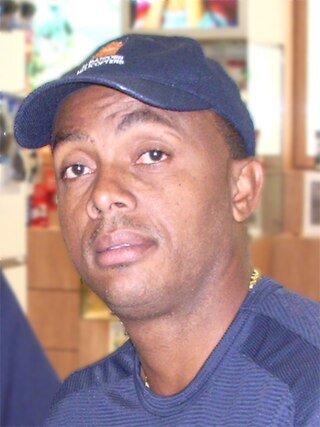
Courtney Andrew Walsh OJ is a former Jamaican cricketer who represented the West Indies from 1984 to 2001, captaining the West Indies in 22 Test matches. He is a fast bowler and considered one of the all-time greats, best known for a remarkable opening bowling partnership along with fellow West Indian Curtly Ambrose for several years. Walsh played 132 Tests and 205 ODIs for the West Indies and took 519 and 227 wickets respectively. He shared 421 Test wickets with Ambrose in 49 matches. He held the record of most Test wickets from 2000, after he broke the record of Kapil Dev. This record was later broken in 2004 by Shane Warne. He was the first bowler to reach 500 wickets in Test cricket. His autobiography is entitled "Heart of the Lion". Walsh was named one of the Wisden Cricketers of the Year in 1987. In October 2010, he was inducted into the ICC Cricket Hall of Fame. He was appointed as the Specialist Bowling Coach of Bangladesh Cricket Team in August 2016.
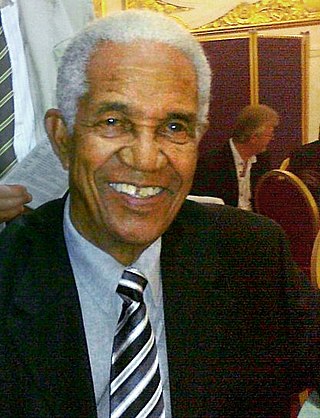
Sir Garfield St Aubrun Sobers, AO, OCC, also known as Sir Gary or Sir Garry Sobers, is a former cricketer who played for the West Indies between 1954 and 1974. A highly skilled bowler, an aggressive batsman and an excellent fielder, he is widely considered to be cricket's greatest ever all-rounder and one of the greatest cricketers of all time.
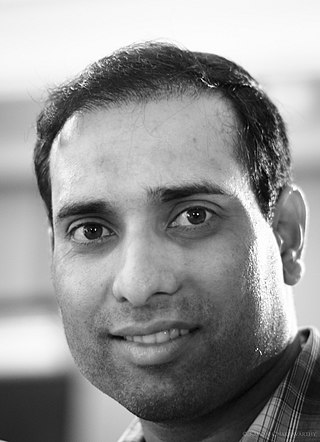
Vangipurapu Venkata Sai Laxman is a former Indian international cricketer and a former cricket commentator and pundit. A right-hand batsman known for his elegant stroke play, Laxman played as a middle-order batsman in Test cricket. Laxman is currently the Head of Cricket at the National Cricket Academy (NCA), and the head coach of the India Under-19 and India A teams. Laxman was a member of the Indian team that was one of the joint-winners of the 2002 ICC Champions Trophy, which the title was also shared with Sri Lanka.
Alan Philip Eric Knott is a former cricketer who represented England at international level in both Tests and One-Day Internationals (ODI). Knott is widely regarded as one of the most eccentric characters in cricket and as one of the greatest wicket-keepers ever to play the game. He was described by cricket journalist Simon Wilde as "a natural gloveman, beautifully economical in his movements and armed with tremendous powers of concentration".
Angus Robert Charles Fraser is an English cricket administrator.
Malcolm Denzil Marshall was a Barbadian cricketer. Primarily a fast bowler, Marshall is widely regarded as one of the greatest and one of the most accomplished fast bowlers of the modern era in Test cricket. He is often acknowledged as the greatest West Indian fast bowler of all time, and certainly one of the most complete fast bowlers the cricketing world ever saw. His Test bowling average of 20.94 is the best of anyone who has taken 200 or more wickets. He achieved his bowling success despite being, by the standards of other fast bowlers of his time, a short man – he stood at 180 cm, while most of the great quicks have been well above 183 cm and many great West Indian fast bowlers, such as Joel Garner, Curtly Ambrose, and Courtney Walsh, were 197 cm or above. He generated fearsome pace from his bowling action, with a dangerous bouncer. He also statistically went on to become the most successful Test match bowler of the 1980s with 235 wickets with an average of 18.47 within a time period of just five years. Marshall was a part of the West Indies team that reached the 1983 Cricket World Cup Final, but lost to India by 43 runs.
Sir Wesley Winfield Hall is a Barbadian former cricketer and politician. A tall, strong and powerfully built man, Hall was a genuine fast bowler and despite his very long run up, he was renowned for his ability to bowl long spells. Hall played 48 Test matches for the West Indies from 1958 to 1969. Hall's opening bowling partnership with fellow Barbadian Charlie Griffith was a feature of the strong West Indies teams throughout the 1960s. Hall was one of the most popular cricketers of his day and was especially popular in Australia, where he played two seasons in the Sheffield Shield with Queensland.

Fazal Mahmood PP, HI was a Pakistani international cricketer. He played in 34 Test matches and took 139 wickets at a bowling average of 24.70. The first Pakistani to pass 100 wickets, he reached the landmark in his 22nd match.

Sir Everton DeCourcy Weekes, KCMG, GCM, OBE was a cricketer from Barbados. A right-handed batsman, he was known as one of the hardest hitters in world cricket. Weekes holds the record for the most consecutive Test hundreds, with five. Along with Frank Worrell and Clyde Walcott, he formed what was known as "The Three Ws" of the West Indies cricket team. Weekes played in 48 Test matches for the West Indies cricket team from 1948 to 1958. He continued to play first-class cricket until 1964, surpassing 12,000 first-class runs in his final innings. As a coach he was in charge of the Canadian team at the 1979 Cricket World Cup, and he was also a commentator and international match referee.
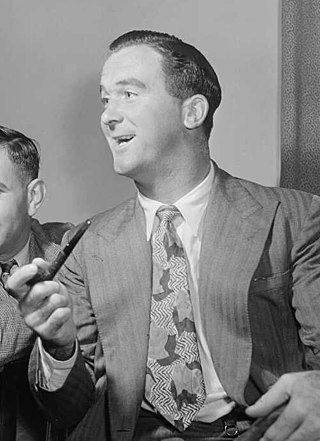
Thomas Godfrey Evans was an English cricketer who played for Kent and England. Described by Wisden as 'arguably the best wicket-keeper the game has ever seen', Evans collected 219 dismissals in 91 Test match appearances between 1946 and 1959 and a total of 1066 in all first-class matches. En route he was the first wicket keeper to reach 200 Test dismissals and the first Englishman to reach both 1000 runs and 100 dismissals and 2000 runs and 200 dismissals in Test cricket. He was a Wisden Cricketer of the Year in 1951.

Robert William Taylor MBE is an English former cricketer who played as wicket-keeper for Derbyshire between 1961 and 1984 and for England between 1971 and 1984. He made 57 Test, and 639 first-class cricket appearances in total, taking 1,473 catches. The 2,069 victims across his entire career is the most of any wicket-keeper in first-class history. He is considered one of the world's most accomplished wicket-keepers. He made his first-class debut for Minor Counties against South Africa in 1960, having made his Staffordshire debut in 1958. He became Derbyshire's first choice wicket-keeper when George Dawkes sustained a career-ending injury. His final First Class appearance was at the Scarborough Festival in 1988. He remained first choice until his retirement except for a short period in 1964 when Laurie Johnson was tried as a batsman-wicketkeeper.
Graham Douglas McKenzie – commonly known as "Garth", after the comic strip hero – is an Australian cricketer who played for Western Australia (1960–74), Leicestershire (1969–75), Transvaal (1979–80) and Australia (1961–71) and was a Wisden Cricketer of the Year in 1965. He succeeded Alan Davidson as Australia's premier fast bowler and was in turn succeeded by Dennis Lillee, playing with both at either end of his career. McKenzie was particularly noted for his muscular physique and ability to take wickets on good batting tracks. His father Eric McKenzie and uncle Douglas McKenzie played cricket for Western Australia. Garth was chosen for the Ashes tour of England in 1961 aged only 20. He made his debut in the Second Test at Lord's, where his 5/37 wrapped up the England innings to give Australia a 5-wicket victory.

The Wisden Trophy was awarded to the winner of the Test cricket series played between England and the West Indies. It was first awarded in 1963 to commemorate the hundredth edition of Wisden Cricketers' Almanack. Series were played in accordance with the future tours programme, with varying lengths of time between tours. If a series was drawn then the country holding the Wisden Trophy retained it. In 2020, it was announced that the trophy would be replaced by the Richards–Botham Trophy named after Sir Vivian Richards and Sir Ian Botham.

Clifford Archibald Roach was a West Indian cricketer who played in West Indies' first Test match in 1928. Two years later, he scored the West Indies' first century in Test matches, followed two matches later by the team's first double century. Roach played for Trinidad, but before having any great success at first-class level, he was chosen to tour England with a West Indies team in 1928 and scored over 1,000 runs. When England played in the West Indies in 1930, he recorded his ground-breaking centuries but had intermittent success at Test level afterwards. He toured Australia in 1930–31 and returned to England in 1933, when he once more passed 1,000 runs, but was dropped from the team in 1935. Within three years, he lost his place in the Trinidad team. Roach was generally inconsistent, but batted in an attacking and attractive style. Outside of cricket, he worked as a solicitor. Later in his life, he suffered from diabetes which necessitated the amputation of both his legs.
Seymour MacDonald Nurse was a Barbadian cricketer. Nurse played 29 Test matches for the West Indies between 1960 and 1969. A powerfully built right-hand batsman and an aggressive, if somewhat impetuous, shotmaker, Nurse preferred to bat in the middle order but was often asked to open the batting. A relative latecomer to high-level cricket, Nurse's Test cricket career came to what many consider a premature end in 1969.
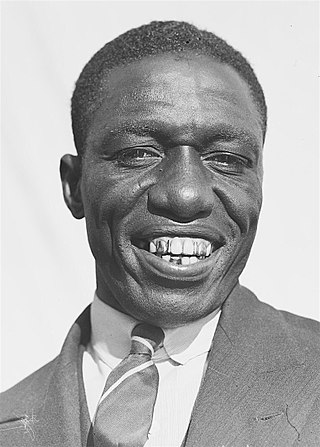
George Nathaniel Francis was a West Indian cricketer who played in West Indies' first Test in their inaugural Test tour of England. He was a fast bowler of renowned pace and was notably successful on West Indies' non-Test playing tour of England in 1923, but he was probably past his peak by the time the West Indies were elevated to Test status. He was born in Trents, St. James, Barbados and died at Black Rock, Saint Michael, also in Barbados.
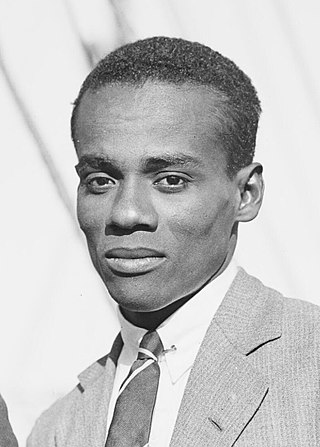
Edwin Lloyd St Hill was a Trinidadian cricketer who played two Test matches for the West Indies in 1930. His brothers, Wilton and Cyl, also played for Trinidad and Tobago; in addition, the former played Test matches for the West Indies.
William Vicente Rodriguez is a former West Indian international cricketer who played in five Test matches from 1962 to 1968.
Enid Bakewell played for the English women's cricket team in 12 Tests between 1968 and 1979, and in 23 one-day international matches. A right-handed batter and slow left-arm orthodox bowler, on her figures she has a strong claim to be regarded as the best all-rounder that the English women's game has produced. In Tests she scored 1,078 runs at an average of 59.88, with 4 centuries, as well as taking 50 wickets at an average of 16.62. In what proved to be her final Test, she scored 68 and 112* and took 10 for 75 against West Indies at Edgbaston in 1979. Her final WODI appearance was in the final of the 1982 Women's Cricket World Cup.